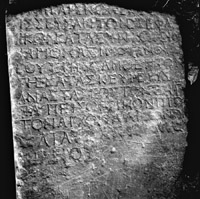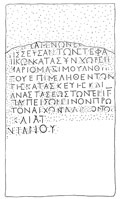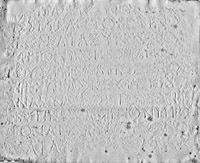 MAMA XI 103 (Akmoneia)
MAMA XI 103 (Akmoneia) 
Statue base, probably of Caracalla
- Type of monument:
- Statue base.
- Location:
- İslâmköy (Akmoneia): in a yard near the railway station.
- Description:
- Bluish-white marble block, said to have been brought from Hatıplar; later re-cut as the winch-bed of a wine-press. Broken above, at front only.
- Dimensions:
- Ht. 0.95; W. 0.545; Th. 0.545; letters 0.025-0.035.
- Record:
- Squeeze; line drawing; MB notebook copy; photograph (1956/69).
- Publication:
- None.
- Date:
- c. AD 215 (proconsul Marius Maximus)
- - - - - - - - - - - - - - - -
[. . .]η̣σαμένων ἐκ̣ [τῶν πε]-
ρισσευσάντων στεφα-
νικῶν κατὰ συνχώρησιν̣
Μ̣αρίου̣ Μαξίμου ἀνθυπά-
5τ̣ου · ἐπιμεληθέντων
τῆς κατασκευῆς καὶ
ἀναστάσεως τῶν περὶ Γ(άϊον)
Πακ̣(ώνιον) Πεισωνεινὸν πρῶ-
τον ἄρχοντα ἀρ[χ]όντων̣
10κ̣αὶ Ἀτ̣[- - - - - - - - - -]-
ν̣ιανοῦ.
...from the surplus aurum coronarium, by permission of the proconsul Marius Maximus. The board of archons for whom C. Pac(onius) Peisoneinos was first archon took care of the construction and erection (of the statue), and At... ...nianus.






L. Marius Maximus Perpetuus Aurelianus (lines 4-5) held the proconsulate of Asia for two years c. AD 215 (PIR2 M 308; TAM V 2, 943). The reading of the abbreviated cognomen in line 8 is doubtful; I have assumed that Peisoneinos carried the gentilician Paconius. For C. Paconii in the province of Asia, compare Wiegand 1901: B62 (Kyzikos: Γ. Πακ. Ἀρτεμίδωρος); Smith and Rustafjaell 1902: 204-6, no. 13, line 24 (Kyzikos: Γ. Πακώνιος Μάρκελλ(ος)). Lines 10-11 were subsequently added in a different hand; to all appearances, a second member of the board of archontes demanded that his name be added to the inscription (see the commentary to MAMA XI 136 [1955/38]).
The aurum coronarium (‘crown-tax’) was a regular money-tax in the Roman imperial period, voted on the occasion of each emperor’s accession and collected in small cash instalments throughout his reign (Bowman 1967; Neeson 1980: 142-5). The term στεφανικόν (lines 2-3) seems first to be attested in the second century AD (Bowman 1967: 60). Individual emperors could also impose extraordinary levies of money in place of aurum coronarium, nominally in celebration of particular events; Caracalla is said to have repeatedly demanded extraordinary cash payments from his subjects ‘in place of’ gold crowns to celebrate his numerous victories (Dio 78.9.2). We have a few cases of emperors refusing or remitting such extraordinary levies as a favour to particular provincial communities (SEG 50, 1096 A11-13: Hadrian refuses the offer of extraordinary aurum coronarium from the city of Aphrodisias) or the empire as a whole (Oliver, Greek Constitutions 275 = P.Fayum 20: Severus Alexander renounces the aurum coronarium marking his accession in AD 222).
In our text, the city of Akmoneia appears to have collected an excess of aurum coronarium, and has been left with surplus funds; the proconsul Marius Maximus has permitted the city to spend it for another purpose, probably the erection of a statue of the emperor Caracalla (lines 6-7, τῆς κατασκευῆς καὶ ἀναστάσεως). For the various purposes to which cities put their surplus revenues, including the erection of imperial statues, see Robert, OMS I 533 n.1; Robert 1937: 319; AE 2006, 1457 (Hierapolis: statue of Septimius Severus erected ἐκ περισσείας [τ]όκων ἀγῶνος Οὐ[α]λεντήων), with Ritti 2006-7: 294-6.
It is possible that the participle in line 1 ought to be restored [αἰτ]η̣σαμένων, a genitive absolute recording the request of the civic authorities (e.g. [τῶν ἀρχόντων αἰτ]η̣σαμένων) to the proconsul for permission to spend the excess aurum coronarium on a statue. The verb αἰτεῖσθαι is regularly used of petitions both by individuals to civic authorities and by civic communities to Roman officials: see Weiss 2000a.